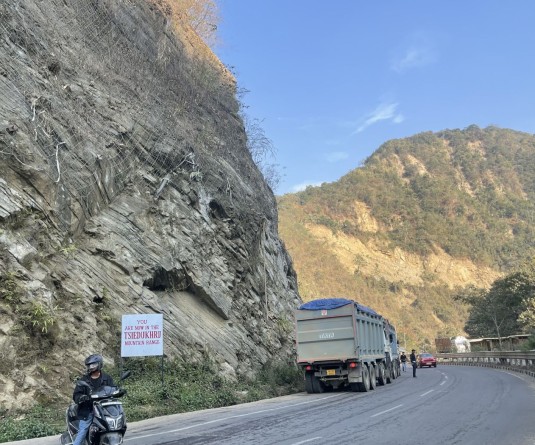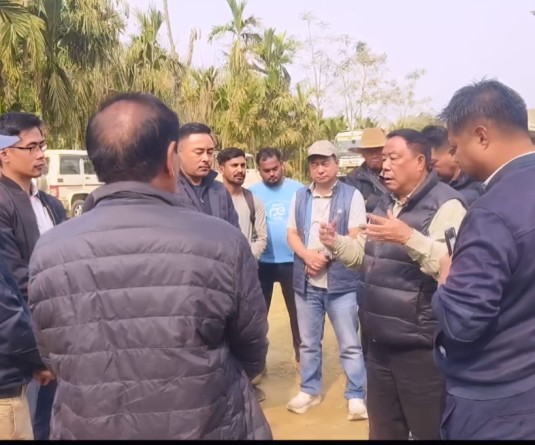Minister Temjen Imna Along interacting with the participants of the panel discussion on ULB elections with 33% reservation for women in Dimapur on April 29. (Morung Photo)
Morung Express News
Dimapur | April 29
Setting one’s sights on provoking conversations around the contentious issue of the Urban Local Bodies (ULBs) with regard to 33% reservation for women, a comprehensive panel discussion was organised at the Seminar Hall of Dimapur Government College (DGC) on April 29.
Each of the panel members gave their insights and inputs towards finding a common ground on what course of action needed to be taken on this matter. Panel members such as Kavili Jakhalu, former Principal of DGC, said that although the participation rate of women during elections is high, it does not translate into representation.
She pointed out that women representation in the decision making process is next to zero. She reasoned this by bringing up historical differences among men and women where men ruled and women served. Moreover, Jakhalu shared the aspect of traditional inheritance laws whereupon women are excluded from it. She therefore stated reservation is needed to provide a level playing field for women.
W Rainbow Ngullie, Central Government Standing Council Panel Lawyer, Enforcement Directorate, who was also a panellist, reasoned that the agitation against the ULB elections during 2017 was not in opposition towards reservation but more against the issue of the other provisions which were part and parcel of the Nagaland Municipal Act (Amendment), 2001.
He specified the issue of taxation, which he said went against the rights and wishes of the Naga people. Moreover, he suggested that introducing taxation without proper guidelines will open the floodgates towards eroding the rights of the people enshrined in article 371 (A).
Bano Haralu, member, Governing Board of the Northeast Network and consultant, Wildlife Conservation Society, spoke on the need for the people to patiently review the act and its provisions. She observed that placing 33% reservation against Article 371 (A) will be to the detriment of the people. She emphasised that the two issues are different. Haralu stressed on the need to look beyond the urban areas and to focus on uplifting womenfolk in the villages, where they have less rights and privileges.
Temjen Imna Along, Minister for Higher Education and Tribal Affairs giving the keynote address said that the State Government is taking this important issue forward. He also stressed on the need for change with regard to change in time.
“We cannot be stronger than women by depriving them of the opportunity to build and to grow,” he noted. Further, he threw upon a question at the men-folk asking, “When we can lead them in everywhere and every time, why not in policy making?”
He said that the idea of reservation has been, “Politicized in the wrong way by our people.” Stressing on the necessity to have rational discourse on such issues he stated that the silence of knowledgeable people will ruin Naga society.
Moreover, in consideration of women’s reservation, he opined that, “Men can always be stronger by elevating women.”
The panel discussion’s culmination came with calling attention towards the need to analyse the act in a more thorough manner along with bringing awareness to the people.
The event was hosted by the Department of Political Science and History, Dimapur Government College in collaboration with IQAC.
Meripeni Ngully, HoD and Associate Professor, DGC, who was the chairperson for the event, earlier underlined that the main objective of the panel discussion was to have an open discourse on ULB elections with 33 % reservation.





